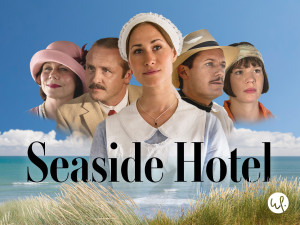 Earlier this year my household found itself without a television series to stream, having finished the available seasons of all the shows we were watching. Some friends recommended Seaside Hotel on PBS and our tastes usually agree, so we gave it a try. We’re glad we did. Very seldom have we been so gently but insistently entertained.
Earlier this year my household found itself without a television series to stream, having finished the available seasons of all the shows we were watching. Some friends recommended Seaside Hotel on PBS and our tastes usually agree, so we gave it a try. We’re glad we did. Very seldom have we been so gently but insistently entertained.
The season began on Denmark’s TV 2 in 2013 and has now run for 10 seasons. For several of those years it has been the most popular fiction program in Denmark. PBS made the first nine seasons available in 2023, under its “Walter Presents” imprint for international dramatic programs. We find ourselves torn between binge watching and not wanting to run out of episodes, especially as fewer and fewer programs are available due to the Hollywood writers’ and actors’ strikes.
Seaside Hotel (Badehotellet in Danish) is a comedy drama set in a small resort hotel on the North Sea in Denmark. The action of Season 1 begins when the usual set of wealthy families and working class staff return for the summer of 1928. This and the next few seasons focus particularly on the personal and professional experiences of Fie Kjær (Rosalinde Mynster), a young local woman who arrives for a job as one of the kitchen and chambermaids. She lives a few villages away, and she wants to be able to send money home to support her widower father whose health is failing. The hotel is owned by a mature couple, Julius and Molly Andersen (Ole Testrup and Bodil Jørgensen); due to her level head, Fie quickly becomes a leader among the staff that also includes Edith (Ulla Vejby), Martha (Ena Spottag) and Otilia (Merete Mærkedahl).
As a mirror image of Fie’s arrival, the first guests we meet are Georg and Therese Madsen (Larse Ranthe and Anne Louise Hassing), an arrogant building contractor and his family, which includes horny teenager Amanda (Amalie Dollerup) and bookish pre-teen Vera (Julie Brochorst Andersen). In 1928, Madsen is one of the few guests to own a car, and in a moment of carelessness he runs over some chickens belonging to a farmer whose property borders what is then known as Andersen’s Hotel. This sets off a conflict with Morten the farmer (Morten Hemmingsen) that is a through line in the entire run of the series.
The other guests include Otto Frigh (Bjarne Henriksen), a cigar and cigarette manufacturer, his wife Alice (Anette Støvelbæk) and their two young children; government employee Hjalmar Aurland (Peter Hesse Overgaard) and his much younger wife Helene (Cecilie Stenspil); famous stage actor Edward Weyse (Jens Jacob Tychsen); Grev Ditmar (Mads Wille), heir of the ailing Count Ditmar, hereditary lord of the local manor; and the bridge-playing widow Lydia Vetterstrøm (Sonja Oppenhagen).
In some ways Seaside Hotel is very much a soap opera, albeit a comic one. The comedy (and occasional tragedies) are essentially Shakespearean, brought on by various individuals’ character flaws, with the occasional interventions of fate. The vain, foppish Weyse, for example, has a history of showing up with a different wife or girlfriend every season, and is plainly unable to conceive that the world doesn’t revolve around himself. Madsen’s arrogance and temper are constantly goading him into unwise business decisions. Illicit romances and flirtations abound, and the upstairs hallway sometimes resembles the set of a French farce as doors open and close with choreographed precision. Many of these folks, staff and guests alike, also have secrets: Who is a closeted gay? Who has an illegitimate child that was raised by an adoptive family? Who has a rebellious younger sister that was sent to a convent school?
As with that other popular imported soap opera Downton Abbey, the time during which Seaside Hotel is set is crucial. In the late ’20s money is abundant and social attitudes are loosening, but we know what the characters don’t, that a crash is coming soon, and even worse is following in its wake. It’s a delight to watch these characters become ever more fully developed, and to see relationships ebb and flow as children grow up and some characters move on in various ways.
Seasons 1-5 each run through a summer season from 1928 to 1932. Seasons 6-8 jump ahead a few years, covering 1939-41, and Season 9 takes place in 1945. Highly recommended. In Danish and some German, with English subtitles. On PBS Passport which you can purchase via iTunes or Amazon Prime.
